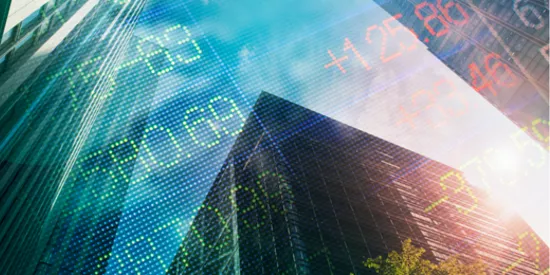
Inflation in 2021: Transitory until proven permanent
Inflation and its long-term impact on society is one of the most important questions facing investors, governments and central banks this year.
With the US Consumer Price Index breaching 5% and the costs of commodities, finished goods and the containers that transport them soaring in many parts of the world, many are worried that decades of benign disinflation are coming to an end…or worse. And they are wondering how to hedge against this risk.
It is, however, too early to conjure the spectre of Weimar Germany argues Kokou Agbo-Bloua, Global Head of Economics, Cross-Asset and Quant Research at Societe Generale Corporate and Investment banking. At this point, “inflation is transitory until proven permanent”, he says. There are several reasons why this is likely to prove the case.
First, what the world is currently experiencing is a textbook case of demand-pull inflation. Putting the global economy into enforced hibernation during the COVID-19 pandemic was necessary to save lives. But it prevented a lot of people from spending a lot of money. Coupled with central bank liquidity injections, excess savings have ballooned -- to some $2.5 trillion or 11% of GDP in the US, for instance. As we emerge from lockdown, much of that money is now being spent, driving prices higher.
The good news is that such “revenge” spending, as we return to partying, holidaying and other forms of social activity, will quickly run into what is known as ‘demand satiety’: the fifth Piña Colada simply does not taste as good as the first one. The fact that most of the excess savings have been accumulated by the wealthiest households, who have a lower marginal propensity to spend, is another reason why not all of this money will flow back into the economy, at least not rapidly.
On the obverse of the coin, businesses that reduced their inventories and lowered their breakeven costs during the pandemic (helped by government support measures like furlough payments) are restocking to meet resurgent demand. This is classic cost-push inflation. At the moment, this is having some ugly-looking effects since it is stretching and, in some cases, breaking supply chains already thinned out by years of globalization.
If we think of supply chains as the arteries of the economy, then quite a few are developing clots as evidenced by the global shortage of microchips or the spike in European gas prices. There is always the risk of a stroke, of course. In all likelihood, though, the surge in corporate investment will correct this situation before long – though perhaps not in time to avoid spoiling Christmas for some western consumers.
A related argument being made by some is that the Energy Transition is the real culprit. Increasing investment in green infrastructure, like batteries and solar panels, is causing shortages of copper and rare earth metals and driving up commodity prices generally. In fact, the reverse is likely to be the case: the rapid growth of Sustainable & Positive Impact Finance (SPIF) is effectively replacing the dwindling liquidity provided by central banks. While their ‘quantitative easing’ stayed largely in the financial system and just inflated asset prices (and inequality), this new green investment cycle is taking place in the real economy. As such, it will contribute to real economic activity and growth for years to come -- and help fight climate change.
Of course, investing in carbon-free energy sources and SPIF initiatives generally will only work if the return on such projects exceeds their cost of capital. In reality, the markets will ensure this is the case as companies that do not switch to sustainable investing find their capital costs rising and may ultimately be denied financing altogether. It is worth standing back and taking note of the speed with which Environmental, Social and Governance (ESG) principles have spread through the investor community.
“The change in how we consider ESG in investment management over the last five years has been profound,” says Altaf Kassam, EMEA Head of Investment Strategy & Research at State Street Global Advisors:“Many institutional investors are integrating ESG considerations across their portfolios and into their stewardship and engagement practices – in EMEA it’s already the majority of our clients and soon I don’t think we’ll be able to have an investment discussion without including ESG.”
Ultimately, we will not know how inflation behaved until after the fact. But it is important not to confuse a jump in prices – made more eye-catching by base effects -- with a persistent series of year-on-year increases. If we start to see regular wage inflation and an expansion of the monetary base, we should grow more concerned; but even these are necessary but not sufficient conditions for (semi-)permanent inflation. Do not underestimate the inertia in the economy and the role played by automatic stabilizers, as households adapt to higher prices by reining in spending again. Newton’s Third Law of Motion put it very elegantly: “to every action, there is an equal and opposite reaction.”
Still, for those concerned to insure their portfolios against undue risks, banks like Societe Generale are able to offer a vast menu of structured products and derivatives that can be tailored to counter either unduly high and rising inflation, or a sudden drop in asset prices, or more or less any scenario that can be imagined. And due to the regulation and added layers of investor protection introduced since the Global Financial Crisis, such products are less complex and less risky in themselves.
For further insights:
_To know more about derivatives, join online on 19 & 20 October the Societe Generale Derivatives and Quant conference. This year’s edition entitled “Solutions for Reflation and the supercycle” has been designed to provide investors with unique insights on market shaping topics.
_Feel free to listen to the podcast series “2050 Investors” on inflation and climate change. It is available on your favorite podcast streaming app Apple Podcast, Spotify, Deezer, Google Podcast, Tune In, Podcast Addict, Stitcher, and Pocket Casts or on the Societe Generale Cross Asset Research website.





